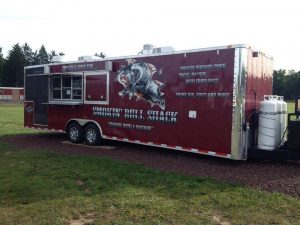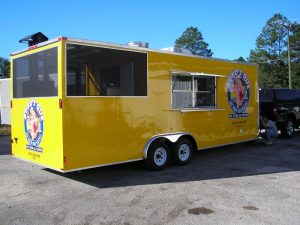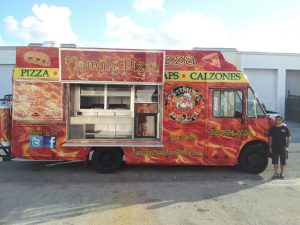The biggest barrier to making money when you’re first getting started with your food truck seems like it should be simple to overcome, but it can become more problematic than you might expect. It’s a simple question: Where are you gonna PUT this thing to sell my food?
Thanks to strict city ordinances, draconian zoning guidelines, and even protests from envious local brick-and-mortar establishments, who may view your food truck as unfair competition for their own businesses, finding a spot to park your truck or concession trailer can be complicated.
Review Your Local Ordinances

BBQ Trailer built by M&R Specialty Trailers and Trucks.
When I started my food truck, I based a lot of my social media marketing and crowdfunding efforts on the idea that I was going to operate my business in Rockland, Maine, a sleepy seaside coastal town of about 8,000 people. With my financing in place and my spiffy new concession trailer all cleaned up and ready to go, there was a major problem: I hadn’t checked in with the local code enforcement officer regarding zoning and ordinances affecting food trucks, prior to making my plans.
It turns out, years earlier, someone had the bright idea to build a restaurant out of a shipping container, and plop it in the middle of the city, which led city council members scrambling to enact new regulations that essentially eliminated the possibility of food trucks or trailers within city limits.
Food trucks were banned from operating within Rockland’s busy “commercial zone,” unless they met a list of absurd conditions that would make no sense for a mobile food business, including “visual guidelines” that would require a brick façade and “carved embellishments” around the windows. Yeah, right.

You can’t just vend anywhere.
There was, however, a bright side. The city had set aside a corner of an under-used waterfront public park for food concessionaires. Though the ordinance only allowed two food trucks to operate at a time (I eventually successfully petitioned to have the ordinance changed to three), this was an incredible bargain: A waterfront location, including electrical, water, and wastewater hookups, bargain priced at then just $500/month, made payable to the city. It was a great deal, and I successfully operated my truck in that location for two seasons.
What’s the point of this little waltz down memory lane? I could have saved myself months of panic about where to put my truck, if I had just placed a quick phone call to my local code enforcement officer before I made any other moves.
He would have explained, before I made the investment in the equipment and made the commitment to operating in a certain town, just what the restrictions were, and how I could potentially avoid or work within them. I would’ve known right away whether I could find a place to legally operate within the local restrictions, or even considered a different town in which to operate. So, before you do anything else, I implore you: Call your local town office, city planner, or code enforcement officer, explain what you’re planning to do, and find out what the restrictions or limitations will be.
Consider Making a Deal with a Private Property Owner

Deals like this can take time to find, but are mutually beneficial.
Have you noticed that almost every major home improvement warehouse has an unaffiliated vendor out in the parking lot, selling Italian sausages and hot dogs? Often, it’s thanks to an agreement with a small business or private property owner.
Usually, mobile food vendors agree to pay a fixed, flat monthly (or daily) rent, or even a percentage of sales, in exchange for a safe place to park and a steady influx of hungry customers. It’s an arrangement that can make perfect sense for all involved: Your local Home Depot will like the extra income, and you’ll have a never ending stream of hungry, stressed-out customers and day laborers to feed.
Hotel chain parking lots, hospitals, building supply stores, supermarkets, and auto part warehouses all make great places to start, but again, check with your local code enforcement office before approaching local businesses for a potential deal. Some city codes will prohibit such an arrangement, even between two private parties.
Food Truck “Pods” or Parks

Built by M&R Specialty Trailers and Trucks.
Though it may run counter to your instincts, food trucks tend to do better when they can “cluster” in groups. Usually, these food trucks aren’t “competing” with one another in the way you might suspect; instead, their strength in numbers can make a food truck park a destination for hungry, adventurous diners.
Think of a shopping mall food court; though the businesses there may be competing, the ability to share resources (like a common seating area, trash cans, carryout trays, etc.) and feed any customer, regardless of what they may be craving at the moment, makes them a huge draw.
If you’re lucky enough to live in a city with a booming food truck culture, look for an established food truck “park” you can join, where you’ll pay a monthly rent in exchange for a place to park, electrical and water hookups, a ready-to-serve group of hungry customers, and the support and camaraderie of other food truck businesses.
Special Events, County Fairs, and Festivals

Find pizza trucks at a festival near you.
For many food trucks, chasing the “festival route” can mean big business. After all, during the summer months, there is some kind of large crowd or festival operating in almost every town and city in America, and it’s certainly possible to earn a living by “jumping” from fair to fair, or festival to festival.
Typically, vendors will pay a fee to the organizer of the event, in exchange for the right to sell there. But some caution is in order: Often, these “vendor fees” can be exorbitantly high, and may not deliver the traffic you were hoping for.
Before signing an agreement with a festival organizer, find out how many attendees the event has hosted in previous years, as well as how many other food vendors will be working the event. It’s also important to ask about additional requirements the festival may have for you as a vendor; some may prohibit the sales of certain kinds of food, or require you to carry liability insurance above and beyond what you already maintain for your food truck or trailer.
Catering
Many food trucks earn a tidy living simply by offering their services to private parties or events. Catering can eliminate a lot of frustrations of the food truck business; after all, if you operate your food truck essentially by appointment only, at fixed, scheduled locations, at a mutually agreed upon cost, and for only a certain number of people and/or hours, it can be much easier to plan ahead.
We’ll talk more about catering in other posts, but for now, tuck it away as another potential source of revenue. We hope this post has helped you identify a few of the most profitable places to park a food truck. Do you have other ideas? Let us know the locations that have worked best for you.

Leave A Comment